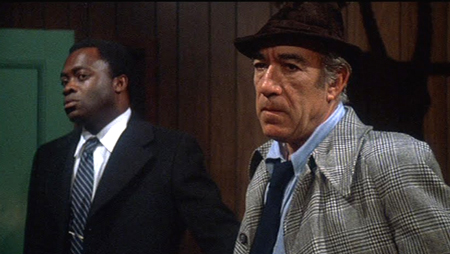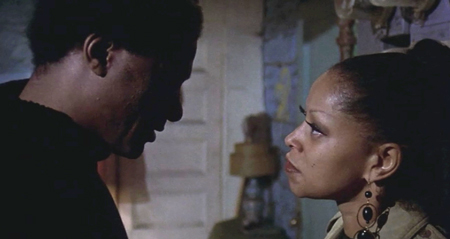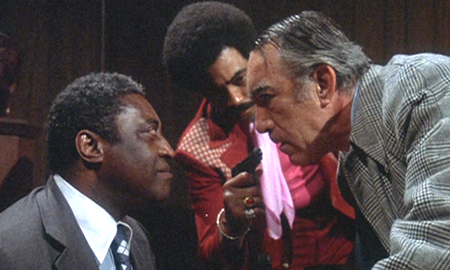|
|
Reviewed by Glenn Erickson
In 1973 I was an usher at the old National Theater in Westwood, and for two months was bumped up to Assistant Manager of NGT's Santa Monica Theater on Wilshire, down around 17th street. That theater had the worst bookings ever, in terms of bringing in audiences. We got stuck with The Wrath of God (terrible), Billy Wilder's Avanti (excellent but nobody came) and even a 3-D porn movie called Prison Girls (dim and out of focus). Among these no-customer hits was United Artists' Across 110th Street, a bleak crime show unsuited for a mostly Anglo 'nabe theater. I didn't see the whole thing; every time I peeked in, somebody was torturing somebody. The nearly colorless print had grain the size of golf balls, and I think the projectionist (who locked himself in the booth and drank all night) turned the bulb luminance down to conserve energy.
Across 110th Street is now better known for its soundtrack, with the general score credited to J. J. Johnson and the Tarantino-friendly main tune the work of Bobby Womack. Seeing the movie for the first time 42 years later, I'm happy to report that it shapes up well, with a credible story, good performances and evocative location filming in Harlem. It's not a problem that the screenplay makes no reference to larger issues of the time, like Vietnam. This is a straight-up gangland tale.

The story concerns a grim twenty hours for some exhausted, desperate people. A trio of black gunslingers robs a numbers counting room in Harlem, where the minions of black boss Doc Johnson (Richard Ward) are handing $300,000 in cash over to the accountants of white Mafia kingpin Don Gennaro (Frank Macetta). A machine gun goes off, leaving three Harlemites, two Italians and two cops dead. Don Gennaro orders his young associate Nick D'Salvio (Anthony Franciosa) to find the killers and wipe them out as gruesomely as possible, to let all of Harlem know who's the boss. Doc Johnson ignores D'Salvio's threats but lends his ruthless main lieutenant Shevvy (Gilbert Lewis) to the effort to locate the thieves. The police are two steps behind. Aging, on-the-take Capt. Mattelli (Anthony Quinn) is told that he must yield leadership in the investigation to the young Lt. Pope (Yaphet Kotto), an ambitious detective angry that none of the white cops respect him. Meanwhile, the three thieves are still at large. The getaway driver Henry Jackson (Antonio Fargas) goes on a bender at a local brothel, advertising that he suddenly has money. Soulful ex-con Joe Logart (Ed Bernard) realizes that it's time to run, and tips off the machine gun-toting Jim Harris (Paul Benjamin) and Jim's girl Gloria Roberts (Norma Donaldson). Each has an escape plan... but both the cops and the hoods are closing in on them.
Across 110th Street shares a lot of black talent with the next year's Bond film Live and Let Die. It seems designed to appeal to black audiences, with Anthonys Quinn and Franciosa on hand to encourage crossover viewers. Lower-tier director Barry Shear seems not have been entreated to soften the script's hard edges. The nasty story is concerned with little more than the violence and pain meted out by the mob to counter an embarrassing crime. The Mafia boss considers Central Park to be a 'moat between us and the niggers', and his craven yes-man D'Salvio is a sadist eager to impress.
The script deftly sketches the pandemonium in the precinct hall, with Mattelli dispensing favors right and left among a mob of black arrestees. New detective Pope is outraged when Captain Mattelli repeatedly bludgeons suspects, as a matter of expedience. The film presents bloody beatings as a standard part of the process.

We also get an eyeful of the outrageously flamboyant Henry hiring several prostitutes with his newfound loot. He then foolishly accompanies them to the brothel bar wearing only a purple silk sheet, a choice he soon regrets. Henry's fling is almost the only fun anyone has in this straight violence and revenge story. One victim of Mafia torture has his arm broken before being hung by his feet from twenty floors up. Another luckless thief dies screaming in an ambulance; it looks as if his face has been cut apart and his eyes gouged out. Later on we learn that the man was castrated and crucified alive. That action happens off-screen, so perhaps UA took mercy on the audience and left them out. The third crook puts up a good fight with his machine gun, decimating his tormentors and giving the audience the dandy action finale they came for. It's an odd truth to action films, but the most satisfying way to pay off a lot of tense torture is to let loose with a big action scene. Both ghetto-based thrillers Uptight and Report to the Commissioner fail in this way; it's difficult to remember exactly how they end. Across 110th Street has the action finale that Machine Gun McCain needed.
Anthony Franciosa is disturbingly convincing as a guy who hugs babies but gets his kicks making broken men grovel in pain. His character isn't afraid to verbally abuse a black chieftain, even when he's in Harlem surrounded by black hoods. Yaphet Kotto comes off with more dignity, even though his character's conflict with Anthony Quinn is overly familiar stuff. For his part, Quinn has an executive producer credit on the film. His career wasn't doing well at this point and his fatigue looks genuine. But for a 55 year-old guy whose face looks even older, he hustles up and down those fire escapes pretty well.

The film's standouts are all black. Antonio Vargas is fine as the crazy guy who blows everything and suffers the most for his foolishness -- but he doesn't rat out his friends. Richard Ward is excellent as a gravel-voiced Harlem rackets chieftain, a leader with guts enough to laugh in Franciosa's face, give Quinn the cold shoulder and even try to help Kotto get his promotion. He runs rackets in numbers, dope and prostitution and yet he's the only hood with ethics. The poor thieves come off as losers who should have had their plane tickets ready before they started out. We can tell that the filmmakers were impressed by actress Marlene Warfield, who plays a young widow too proud to cry in front of the cops. Ms. Warfield later won the plum role of the militant radical in Sidney Lumet's Network, the woman whose Marxist rhetoric morphs into negotiation demands for ancillary rights to her new TV show.
The KL Studio Classics Blu-ray of Across 110th Street is also a visual surprise. The image has muted colors and a gritty look, but hues are accurate and the dark scenes look realistic, not murky. And since it comes from a source near the original negative, it easily beats the appearance of original 1972 prints. The movie is now watchable. In fact, it has style.

Bobby Womack's title tune is there, if not in as punchy a version as heard on the original soundtrack album. At the time the film was noted for its use of Fouad Said's new 'Cinemobile' system, a heavily promoted set of studio equipment trucks. Before, the unions hauled tons of ordinary lights and whatnot to the streets, equipment that hadn't been redesigned since the 1930s.. Across 110th Street never seems cramped by filming on crowded streets, presumably among hundreds of curious onlookers.
On a scale of Excellent, Good, Fair, and Poor,
Across 110th Street Blu-ray rates:
Movie: Very Good
Video: Excellent
Sound: Excellent
Supplements: none
Deaf and Hearing Impaired Friendly?
N0; Subtitles: None
Packaging: Keep case
Reviewed: September 13, 2014

Text © Copyright 2014 Glenn Erickson
See more exclusive reviews on the Savant Main Page.
Reviews on the Savant main site have additional credits information and are often updated and annotated with reader input and graphics.
T'was Ever Thus.
Return to Top of Page
|

